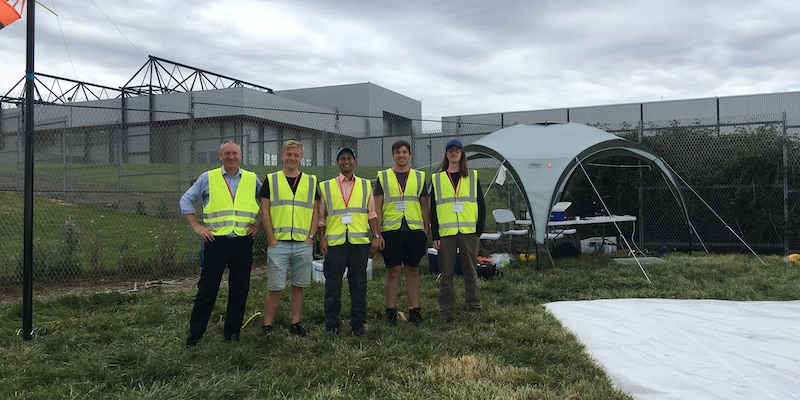
Along with our partners, Flare Bright, we have completed the second round of more advanced trials at Cardiff Airport, which will contribute to the transformation of urban flight. Designed to validate an essential piece of drone safety, these tests are part of our world-first project, SafeZone, to increase the safety and viability of drone flight through a new aerodynamic data service.
These trials have elevated the SafeZone team’s results to a new level. As in the first set of tests, the flight trials were in proximity to the British Airways maintenance hangar to help model, predict and measure the wind effects that are created by aircraft around large buildings. This second set of trials took place within the ‘manoeuvring area’ of the airport.
The team’s tests in these more challenging conditions were again conducted successfully, using the very latest in computational techniques from our team, and the ground-breaking capabilities of Flare Bright’s wind-measuring nano drone. The partnership plans to use these results to enable the delivery of a new live data service to provide real-time information about aerodynamic hazards in urbanised environments.
Ultimately, these results will make drone flight viable in the cityscape, allowing drones to adapt their route as they fly through wind changes. This is a game-changer for the future of flight; with the assurance of safety, urban UAVs have the potential to improve sustainability, ease congestion and increase capability in a wide range of fields, from logistics to the emergency services.
The SafeZone team appreciates the support of Cardiff Airport in these trials and their openness and support in helping tech companies to develop future capabilities.
David Standingford, Founder and Co-Director, Zenotech, commented:
“The SafeZone team have been overwhelmed by Cardiff Airport’s support in this project and their commitment to future flight innovation. We would like to thank Rob Elias, Head of Airfield Operations, in particular, for going the extra mile to allow us to test on the site.
“This project is a world-first and will make a huge impact on the future of urban flight. These new trials in the ‘critical area’ are a real step forward towards commercial viability as it is vital to obtain real data for validation”.
SafeZone is part of the Future Flight Challenge, delivered by UK Research and Innovation (UKRI), and designed to position the UK as a world leader in aviation.